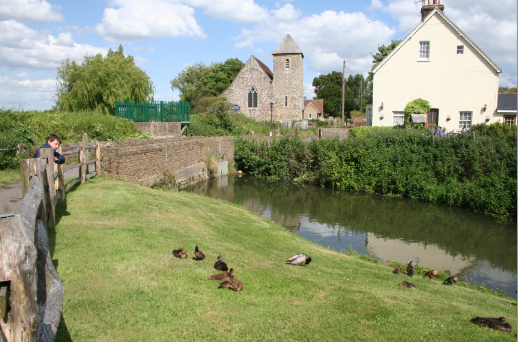Estuary weekend
This is the story of Elland Rose and the reptile. Elland Rose is a tough, little Colvic 26 footer, punningly-named after the seating area of her owner’s favourite football team’s home ground, which he can no longer afford to enter.
Reptile is her tender, christened after her lizard-like appearance from the cracked and fissured house emulsion used to coat her topsides. It is – like all tried and tested methods of evolution – a survival technique. Other, more glossy-coated tenders have mysteriously disappeared from the environs of Two Tree Island, Canvey’s little sister in the Thames Estuary. Yet reptile lives on, along with the slow worms, adders and brown rats on this former rubbish tip and sewage farm where doggies meet by day and doggers by night.
Southend-on-Sea Borough Council, provide the facility of discarded scaffolding tubes, two padlocked sheds and a wheelie bin enclosure for yachtsmen who wish to make the most of the relatively deep water available for this part of the estuary. Avocets allegedly breed on the island, the council say, which is doubtless something to do with the metalled road they provide, which would disembowel a Tiger tank, and therefore is discouraging for all except the most determined off roader. Or those wishing to get to their boats.
This weekend just past, Elland Rose and reptile made a trip up the River Medway in Kent. I went along, too, acting as pilot to Elland Rose’s skipper, Nigel Manning and his crew Les Goddard, press-ganged from the local British Legion Club whose members help heroes by drinking. For England.
All went well until we dropped anchor at the top end of Stangate Creek. It had been a hot day, but the sun was now sinking fast and Halstow Creek had not enough water in it for us to get Elland Rose any nearer to an establishment which could provide food and water. And my companions felt their duty to drink to the health of God and Country was calling upon them again.
So we rowed reptile into the nearest terra firma, carried her up the dislodged and weed- covered rag stones of a forgotten sea wall and started to yomp towards human habitation.
The sea wall itself was thigh high in thistles and as I was wearing shorts my legs soon looked like I’d prepared them for slow-cooking. We tried the shoreline instead. This was littered with broken bottles, pulverised water closets, and end-of-line concrete street lamp standards used in a half-hearted attempt at combating coastal erosion. As night fell it was a challenging obstacle course: fly-tipped man-made objects, are difficult terrain to anticipate, especially when mixed in with temperate zone jungalia.
We headed back over the sea wall and tried to access the adjoining field. My sandalled feet provided excellent foundation submerged as they were in a stagnant bog and helped me cross it to a three-stranded, barbed wire fence which removed the seat of my shorts as I scaled it. They’ll be crag-hopping no more.
Suddenly skipper shouted in the darkness: ‘Will I get bitten by a snake?’
To which Les, an ex-Army man, replied: ‘No chance they run away as soon as they feel t’ground vibrate.’ Which while reassuring was not as comforting as the distant light we could now see meant deliverance.
The Three Tuns at Halstow welcomed our wallets with open arms and my companions wasted no time ordering foaming pints of excellent beer. Sadly it was too late to order dinner as the kitchen was closed. So we dined on pistacio nuts, pork scratching, and pickled eggs.
Then Nigel noticed that large platters of sandwiches, pies and filled rolls had been left uneaten by the noisy wedding reception which had moved on to the later night offerings of the Medway towns.
Cadgingly, as the pub closed, I smiled at the chief bar lady and asked if she could spare a sarnie or two. ‘No, they’re for the staff,’ she said as the groaning platters were whisked away before our pop-out eyes and salivating lips and we were ejected into the very dark night.
‘I’m not going to beg for bloody sarnie,’ said Les his gruff Yorkshire accent overheard by a passer-by. ‘What’s up? ‘ asked the stranger. We explained. Our new friend just laughed: ‘You know they named the pub after the barmaids?’ he cackled, a statement which is almost certainly false and a trifle insensitive.
But as with all such adventures it was sailors who came to our rescue. Three of them. Three Lithuanian yachtsmen going off for a night on their mini-Transat-style yacht. They’d carefully been provided with a mooring with the least water in Halstow Creek and she sat upright like a model, her keel impaled in deep ooze, until the tide came back which it now had. But this event is over in the blink of an eye and therefore our saviours were understandably keen to get moving.
‘Watch the wreck,’ the elder of them said as his head torch blinded the helmsman and the rest of us. Perish the thought that our hosts’ nationality had anything to do with the fact that the they’d been alotted a mooring not just on highest part of the sea-bed, but alongside a hulked Thames sailing barge, dumped there half a century before, because as a hazard to navigation it was not even going to merit a Notice to Mariners.
Despite the head torch we spotted the wreck’s marker pole and we were sailed back to Elland Rose.
So whoever you are my fellow sailors thank-you for rescuing three yachtsmen from a return trek through hell.




